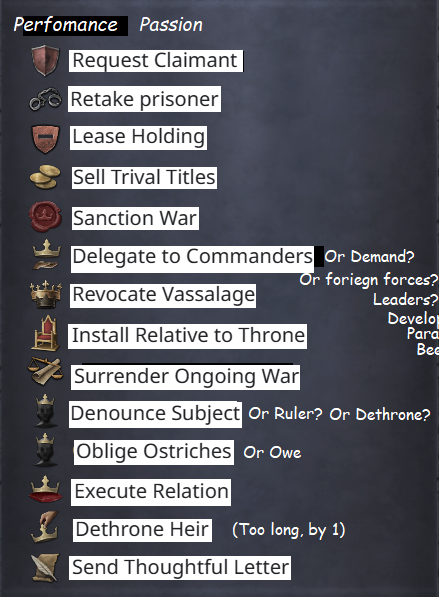While I agree that sounds fun, were early feudal rulers that strategic ? My understanding was that they had a very extractive approach to economy, only looking to ensure taxes on short term, like building bridges because they knew they could tax the hell out of it and not really thinking about it as infrastructure or an investment facilitating the flow of goods. There wasn't really any "state" to begin with in most of places, and most of evolution in trade, innovations and development would occur outside of rulers involvement.
In other words, they were a lot blinder to the state of economy than eu4 timeframe rulers who disposed of actual bureaucracy and state capacity.
But I'm maybe wrong on this medieval stuff.
Do you know what the defining difference was between a city and a village in medieval times? It's market rights. The right to hold market, for which you have to import something in order to sell it. Goods that weren't readily available everywhere. That included things that were sold as they came, i.e. wine, furs etc., but also many processed goods, that were crafted by expert artisans using those rare goods.
The time in which the number of market towns rapidly increased was the 11th century, which is still well into the first half of the game's time period. That is where trade in Europe started to become a thing. It also wasn't uncommon to demand from a trader, in addition to a toll, to stay a day or two and offer their goods to the local community. Cities sitting on a river (on which goods were transported) often did that.
You're right, of course, feudal castles weren't known for their trade, and many nobles didn't hold cities and therefore only collected tolls. But it was the king/emperor who gave out market rights to cities, and you can bet they got something in return for it. The medieval practice of giving out market rights to certain settlements goes back to Charlemagne, so it actually predates the earliest starting year of the game. That is also where the CK3 system currently falls short with its hard distinction between castle and city holdings. Cities like Rome, Constantinople, London etc. weren't a feudal castle, but not calling them a city would be an insult. But you can bet they all had market rights and were centers of trade.
So, while you're right that many local nobles didn't have any economic thinking (especially not in terms of GDP), they still needed cities to meet their more refined needs. Where do you think all the spices for their daily food, all the fine textiles for clothing, the colors, the artists and painters came from? Even something simple as a stone quarry with expert stone masons was of great value, as you needed them to build/upgrade castles or build big churches. Especially the clergy was in huge demand for stone, art and textiles, for fine works of gold and silver etc.
Nobles (to which I also count theocratic rulers like bishops) were well aware of how important trade was, what access to certain resources and their value meant, they knew the importance of ports for trade and directly profited from it. Not just in taxes, but also in getting what they needed. The higher you went up the ladder, the more economic the thinking became.
Venice, for example, only rose to power because it was the main trade hub between the ERE and HRE. The 4th crusade against the ERE was a direct consequence of Venice fighting for economic dominance. Extremely interesting to read how the whole thing started and went on for years.
Anyway, I had a book once that covered the life of the local clergy in medieval times. There it was described that the bishop here engaged in vivid trade to import good wine, and could become very cranky if he didn't get any. In exchange he gave fur, for which the local region was known. One time the other bishop, who provided the wine, played a prank on our local bishop. He told his envoy to keep the wine delivery outside the city and tell the bishop here that the delivery was lost. Then the historian went on to describe how the bishop jumped into a fit of rage, before the envoy - in modern terms - said "it's a prank, bro!". After that the wine was brought in and the bishop was "as peaceful as a lamb".
Just to show that even the selfish demand of a single small and local ruler for luxury goods could lead to trade deals between two regions. It wasn't always economic thinking that led to trade.
This was also part of the problem Europe had with the Muslims sitting on the Silk Road. They not only collected tolls, but their growing empire also took more and more of those goods for itself, leaving less and less for everyone down the line. This in turn set up the need to find a way around the Silk Road by sea, which then led to the events that Europa Universalis covers.





